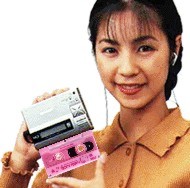Audio equipment maker strives for greater compatibility, lower price points
April 1st, 1999
 |
| Photo courtesy Martin Lazak |
 |
| Photo courtesy Martin Lazak |
TOKYO (Shigatsu-Baka news agency) According to reliable reports, Philips, Sony and Sharp are developing a new format called MD-CC (Mini Digital - Compact Cassette) for the North American market. Industry insiders today revealed that Japan's audio equipment industry has finally reached a conclusion that was clear to MD's detractors from the start, namely that MD is too expensive and incompatible and will never be accepted. ``Our downfall with MD was in striving for high quality sound,'' said a Sony researcher, ``when we looked again and studied the problem carefully we discovered that Americans are basically willing to ignore poor sound quality if an audio player is cheap enough. In fact, in our newly developed psychoeconoacoustic listening tests we found the ten dollar price point to be a surprisingly strong noise masker.''
The other problem the MD industry has faced is rapid encroachment from the World Wide Web and its widespread MP3 audio sites. ``When we heard there were over 50 million teenagers in America with PCs, Internet connections, and a stockpile of CD-R blanks sufficient to download and burn each week's Top-40 well into the next millennium, we realized it was time to wake up and smell the coffee,'' said an executive close to the project.
The new format will use a much cheaper mechanism and a Compact Cassette tape, recording 90 minutes of ATRAC encoded data on each cassette. ``We've finally managed to increase capacity beyond MD's 80 minutes, which is something a lot of folks had been asking for,'' said a Sony engineer, ``Unfortunately,'' he added, ``you do have to flip it over in the middle.'' To achieve ``instant random access,'' and many of the editing functions MD has, each MD-CC cassette will have a small flash memory chip to hold UTOC data. In an interview, one Sharp engineer said proudly that UTOC errors would now be a thing of the past, though he noted its new reliability ``does take some of the excitement out of wondering whether your recording will suddenly go `poof' at the last minute.''
In a major move for Sony, the user interface has been cleaned up and the ``End-Search'' function has been removed. ``We were getting a lot of complaints about the End-Search feature, and at the same time MD was taking a beating in the marketplace from CD-R. We realized we could address both problems simultaneously just by dropping End-Search altogether,'' explained a marketing staffer. With MD-CC, recordings always append to the end, so once a tape is full it is complete, just as with CD-R. Going beyond CD-R however, MD-CC recordings can be made again starting from the beginning of the tape, providing essentially the same flexibility people have come to appreciate in CD-RW.
MD-CC players will be widely available at US retailers and discount department stores by Christmas, starting at MSRP $9.99 for the base model (in cardboard-backed blister-packs for peg-board displays). ``We've ramped production way up from the very beginning to cut costs -- we're not going to make the same mistake we did with MD!,'' said a Sony executive newly appointed to the project.
(April Fools -- Just kidding! -eaw & friends)